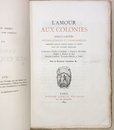L'AMOUR AUX COLONIES
[CURIOSA] Dr. Jacobus X. L'AMOUR AUX COLONIES. Singularités physiologiques et passionnelles observées durant trente années de séjour dans les colonies françaises. Cochinchine, Tonkin et Cambodge. Guyane et Martinique, Sénégal et Rivières du Sud, Nouvelle-Calédonie, Nouvelles- Hébrides et Tahiti. Par le docteur Jacobus X ....
Paris, Isidore Liseux, 1893.
(24 x 15.5 cm) [i-v] vi-vii [viii], [1-3] 4-396 pp. Sympathetic modern goatskin spine over marbled paper boards with five raised bands, title and date in gilt, top edge trimmed, other edges untrimmed. A trimmed portion of the original front wrapper laid in. First Edition, printed in 330 copies on large, vergé de Hollande paper (this copy no. 113). Fine copy.
Unknown to O'Reilly (Tahiti et Nouvelles Hébrides) ; only his “Bibliographie de la Nouvelle-Calédonie” mentions (quickly and modestly, without the slightest comment) this somewhat sulphurous work. Pia 36-37.
Presented as a socio-anthropological study conducted over a 30-year stay in the French colonies, the book is, nonetheless, part of the Collection de l’Enfer of the Bibliothèque Nationale. In his consideration of the singularités physiologiques et passionnelles [physiological and passionate singularities] of the populations in Indochina, the West Indies, Guyana, Senegal and French Polynesia, the author spills considerable ink on topics such as adultery, erotic dance, masturbation, coitus, pedophilia, sodomy, lesbianism, the shape, color, and form of female genitalia, as well as marriage, housing, culinary habits, dress, and other more conventional social customs.
The Doctor Jacobus (a pseudonym used by more than one author) sets out the intentions of his work as follows:
Grace aux soins que ma profession me permettait de donner aux indigènes et a l'étude de leurs langues, j'ai pu gagner leur confiance et voit de très près leurs moeurs, genre de vie, habitudes, etc.... Ma spécialité des maladies des organes génitaux-urinaires m'a permis d'étudier sur le vif, et de recueillir de nombreuses et précieuses confidences. -- Je ne me suis pas contenté d'observer les effets des passions humaines: il m'a paru indispensable de remonter a leurs causes morales, et d'en faire l'étude psychologique… p. [v].
Thanks to the care that my profession allowed me to give to the natives and to the study of their languages, I managed to gain their confidence and observe from close distance their mores, social customs, habits, etc. .... My specialty in genital and urinary tract diseases allowed me to study first hand, and to collect many valuable confidences. I did not satisfy myself with observing the effects of human passions; it seemed to me indispensable to go back to their moral causes, and to make a psychological study of them… p. [v] – (tr).
This is not an obscene book, but a psychological document for the general history of Love:
Dr. Jacobus goes on to say in his preface:
“This is not an obscene book, but a psychological document for the general history of Love in the human race, a stone brought to this vast building just under construction (...) I saw everything I say, because nothing stopped me in what I believe to be the truth (...) I write only for the small number of studious people, searchers of the unchanging truth, to whom I offer it here without veils, stripped of conventional tinsel…”[1]
This work is indeed probably the most “daring” book on the supposed sexual customs of the natives of Indochina, the West Indies, Guyana, Senegal and French Polynesia. Specialized travel bibliographies do not mention it (with the exception of O'Reilly, Nouvelle-Calédonie): We do not know, moreover, whether this deficiency is due to its rarity or its content; likely both. This book is however a valuable document on sexual habits and customs and the fantasies they arouse, because no one, it seems, has gone so far in this singular “exploration”...
[1] “Ce n'est donc pas ici un ouvrage obscène mais un document psychologique pour l'histoire générale de l'Amour dans la race humaine, une pierre apportée à ce vaste édifice à peine en construction (…) J'ai vu tout ce que je raconte, car rien ne m'a arrêté dans ce que je crois être la vérité (…) Je n'écris que pour le petit nombre des gens studieux, chercheurs de l'immuable vérité, à qui je l'offre ici sans voiles, dépouillée des oripeaux conventionnels…” p. vi

